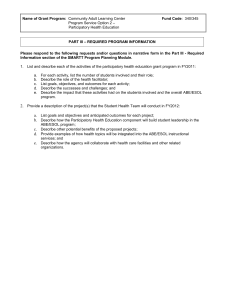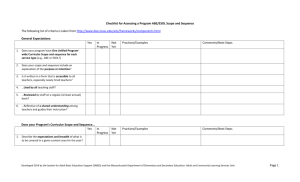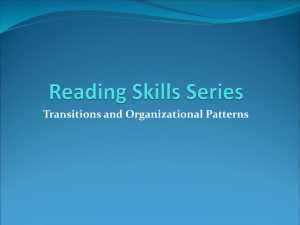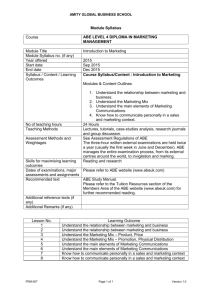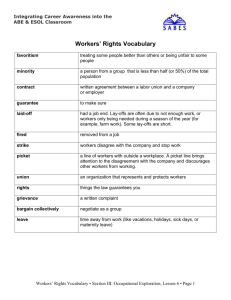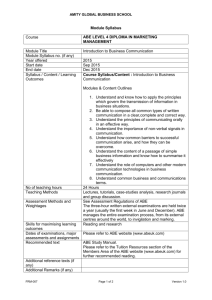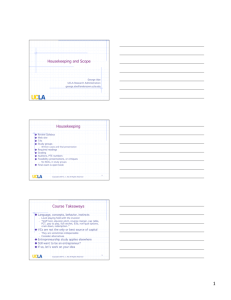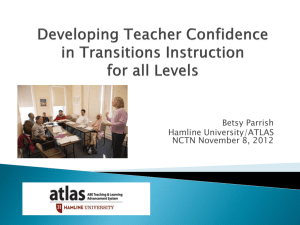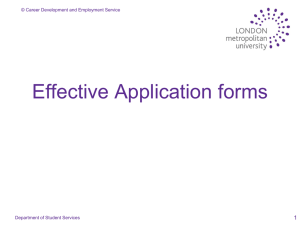Integrating_Career_Awareness
advertisement
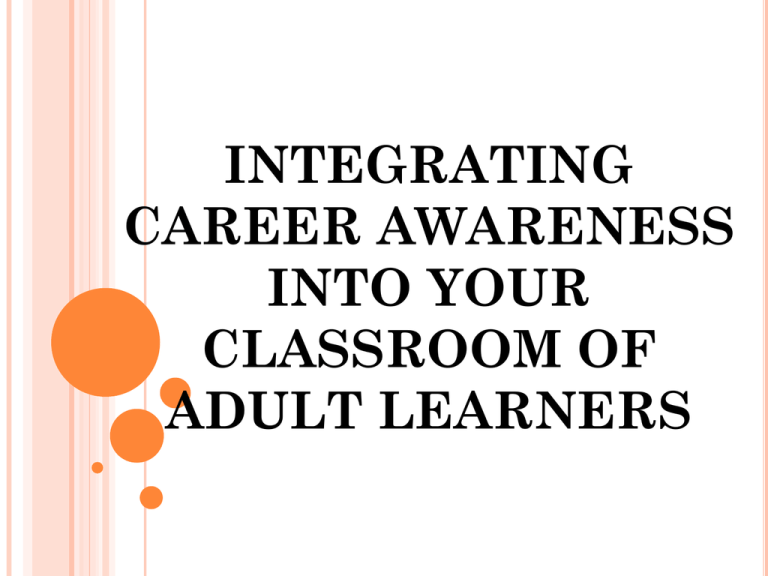
INTEGRATING CAREER AWARENESS INTO YOUR CLASSROOM OF ADULT LEARNERS PRESENTERS Madelyn Litz Career Counselor & College Transitions Coordinator MSAD 61 & 72 Regional Adult Education Lorraine Robida Director Marshwood Adult & Community Education Kittery Adult Education AGENDA • Introductions • The Curriculum • • • • Overview How to Use the Curriculum Hands-On Group Work Wrap-Up PRESENTATION DESCRIPTION Adults who are able to link career interests to their educational efforts are more likely to be persistent learners. Participants in this workshop will learn about and experience the free, user friendly curriculum, Integrating Career Awareness into the ABE and ESOL Classroom. You will learn how students of all levels, including college transitions, can use the career planning model to explore personal beliefs, interests, occupations and labor markets as they plan for future careers. INTRODUCTIONS Who are we? Who are our students? What do you hope to learn today? INTEGRATING CAREER AWARENESS INTO THE ABE & ESOL CLASSROOM www.collegetransition.org/publications.icacurriculum.html Martha Oesch Carol Bower National College Transition Network (NCTN) System for Adult Basic Education Support (SABES) A CRITICAL LINK EDUCATION CAREER CURRICULUM OVERVIEW Flexible Adaptive ASE ABE, ESOL/ELL, College Transitions NRS Functioning Levels: Levels 4-6 ABE/ASE Levels 4-6 ESL THE CURRICULUM GUIDE 210 pages “How to Use This Guide” 47 Lessons Copy-ready/Modifiable Handouts Appendix: “Lesson Planning Template” LESSONS 47 Lessons 4 Sections Cultural Content for Career Awareness Self-Exploration Occupational Exploration Career and Educational Planning THE ANANTOMY OF A LESSON PLAN Title Learning Objective Materials Needed Vocabulary SCANS Competency Secretary’s Commission on Achieving Necessary Skills (2000) Kind of skills and competencies needs to succeed in today’s workplace 5 competencies: Resources, Interpersonal, Information, Systems, Technology Instructions for Conducting the Activity Extension Activities LESSON5 The Influence of Family and Friends (Topic) Learning Objective to identify and explore students’ awareness of the influence of family and friends Materials Needed Alta Language Builder: Occupation Cards or magazines to cut up Vocabulary advise, advice, guidance, influence, names of family members (wife, husband, boyfriend, girlfriend, mother, father, father-inlaw, uncle, aunt, etc.), friend, co-worker, colleague, priest, minister, pastor, imam, teacher, rabbi, doctor, working “under the table” SCANS Competencies Information: Interprets and communicates information Systems: Understands systems Thinking: Reasoning (Also Resources and Interpersonal) Instructions for Conducting the Activity In this activity, you will model a “family job tree” to help students identify the influences in their lives. First, draw a job tree of your own family on the board. It can be real or fictitious. An example might be: My Family’s Job tree Father: truck driver Mom: Safeway checker Grandfather: coal miner Uncle: unemployed Step-Brother: construction worker & “works under the table” making cabinets for friends Me: __________________________________________ Ask the students to draw their own “family job trees.” the tree may include mother, father, step-relatives, foster relatives, aunts, uncles, grandparents and other people who have had a significant impact on their lives. then lead a discussion using the questions below: • What are the major jobs that members of your family have had? • What kinds of jobs did most of the men have? • What kinds of jobs did the women have? • How have technological changes affected jobs? • How did your family’s jobs shape their lifestyles and values? • What education, skills, or qualities are necessary for these jobs? • Have members in your family encouraged you in any way to learn about their jobs, or go into the field that they are in? how? Give specific examples. • Is there a job pattern in your family? • If you can talk to some of your relatives, ask them what they would have really wanted to do with their lives if they had had the opportunity to do so. what else would you ask them? • In general, how do careers of family members affect career choices? • Include your children in the job tree. how can the job tree change? Extension Activity Ask the students to circle members in the family whom they go to for help. For example, the teacher can start by asking “who do you talk to when your child is sick” or “who do you talk to if you have a conflict with a friend?” then ask each student to remember or think about who he or she talked to (or would talk to) in making employment decisions. • who did you talk to? • why did you choose that person(s)? • what advice did the person(s) give you? • Did you follow the advice? why or why not? Note that there is no right person to talk to—it depends on your background and circumstances. wrap-up the lesson by pointing out that we all seek advice and are influenced by family and friends. It is important to be aware of those influences and how they can both help and hinder us as we explore careers. Adapted from “Personal Management: An Integrated Curriculum,” Patti McLaughlin, Curriculum Developer, Adult Basic and Literacy Educators Network of Washington, 1993 SECTION 1, LESSON 5 The Influence of Friends and Family MY FAMILY TREE General Contractor Carpenter Educator Factory Worker/ CNA LPN Draw your own family job tree. (approx 5 min) Use your family job tree to respond to the questions on page 25. (approx 5 minutes) Discuss your experience with a partner. (5 minutes) Be prepared to report out your experience. SECTION II, LESSON 5 Making a Life Line MY LIFE LINE Social Worker ECE Teacher • DHS • School Adult Education Instructor (ECE) ECE Adjunct Faculty Adult Education • Instructor • College Transitions What? When? Where? Who? Why? Adult Education Director YOUR TURN Create a Job/Career Life Line Review the Life Line using the 5Ws as your guide. Consider what your next step might be. Discuss Be your experience with a partner. prepared to share. SECTION III, LESSON 3 Informational Interviews SECTION IV, LESSON 7 Problem Solving WRAP UP AND QUESTIONS
